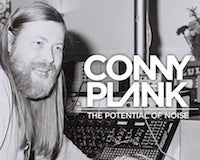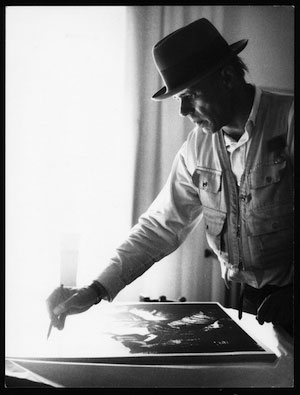Between 22nd November and 31st January 2019, Fokus: Films from Germany will celebrate the multifaceted nature of German contemporary filmmaking. Together with Filmhouse Edinburgh the Goethe-Institut Glasgow has put together a selection of films showcasing unique voices in German film.

Programmed by the Goethe-Institut in Glasgow and Filmhouse in Edinburgh, the festival opens in Edinburgh with Conny Plank: The Potential of Noise, a documentary about one of the most innovative sound designers of his time. Conny Plank was the pioneer of Krautrock, Neue Deutsche Welle and paved the way for the revolutions in electronic and pop music respectively. This is a story that begins 25 years on, with Stephan Plank embarking on a journey to rediscover his father’s impact and his importance in music history.
The festival also showcases a range of aesthetics created by female directors working in Germany; such as Berlin filmmaker Valeska Grisebach:
Her internationally recognised film Longing opens up intimate insights into the triangular relationship between a metal worker, his wife and his lover.
Her latest movie Western is a striking existential study of masculinity that tips its hat to classic genre cinema. Last year it premiered at the 70th Festival de Cannes in the Un Certain Regard section and received numerous distinctions worldwide.
Also part of the selection are the films of Margarethe von Trotta, who was the first female director to win the Golden Lion at Venice Film Festival. Moreover, she made some of the most trailblazing films of the past five decades. One of the most gifted – but often overlooked – directors to come from the New German Cinema movement at the same time as Rainer Werner Fassbinder and Werner Herzog.
The Lost Honour of Katharina Blum is a stinging commentary on individual freedom and media manipulation that still feels as topical as ever.
The Second Awakening of Christa Klages is based on a true story of a young mother who robbed a bank in order to raise funds for her daughter’s day-care centre.
In Rosa Luxemburg, one of the most fascinating figures in modern European history is brought alive by von Trotta’s long-time regular, actor Barbara Sukowa (Fassbinder’s Lola).
The German Sisters tells a prescient and intimate story of Germany, following siblings Marianne and Juliane as they fight for rights and revolution.

In her debut feature film The Queen of Niendorf, which also won the Achtung Berlin! – New Berlin Film Award 2017, the young female director Joya Thome tackles the topic of gender through the eyes of children. Ten-year old Lea lives in a little town in Brandenburg. Her summer holidays seems to be different this year because the girls in her class seem to behave strangely towards Lea. When she meets a boy gang in her town Lea sets a goal for her holidays: she wants to show them that girls are just as brave as boys.
In his documentary Berlin Excelsior, director Erik Lemke gives a deep insight into the anonymous concrete construction Excelsior. For many inhabitants it is just a stopover. Soon, life will get better and everyone tries to get ahead in his own way. In the film In the Aisles introverted Christian discovers love, friendship and a whole new and mysterious world between the aisles of a wholesale market. This year, In the Aisles was nominated for best feature film at the German Film Awards and Franz Rogowski, who is playing Christian, was celebrated as the best actor in a leading role. And Sandra Hüller was nominated for best actor in a supporting role and is, moreover, well-known for her lead role in the Oscar-tipped German comedy Tony Erdmann.

Can a mother leave her family and if so, is it possible to empathise with her? In the film Freedom, director Jan Speckenbach invites his audience to take a non-judgemental look at Nora and her decision to seek a life and identity outside her family confines. Nora is played by seasoned German actor Johanna Wokalek, who is best known for her award-winning appearances in the German films Hierankl, Barfuss, and The Baader Meinhof Complex. She also played the lead role in the film Pope Joan in 2009.
With his controversial art performances Joseph Beuys was a taboo breaker and cryptic activist. In the documentary Beuys Andres Veiel facilitates an illuminating retrospective look at Beuys’ socially engaged art. “Do you want to make a revolution without laughing?” he asks – and laughs. His expanded concept of art took him right to the heart of today’s relevant social debates.
Fokus 2018 will also feature two powerful films that directly speak to the current rise in xenophobia and far right political movements in Europe (and now further afield). Naomi’s Journey takes a close look at the language and the proceedings of a court case in the context of marriage and poverty migration. Wild Heart deals with the punk band Feine Sahne Fischfilet and their lead singer Jan “Monchi” Gorkow, who instrumentalise their music against right-wing radicalism. Last year the documentary won four awards at the Internationales Leipziger Festival für Dokumentar- und Animationsfilm receiving the highest number of awards at Dok Leipzig 2017.
Hans-Georg Thönges, Director of the Goethe-Institut Glasgow said:
Film is the contemporary expression of the arts that probably excites us most.” says .“Films from Germany are movies with passion, humor, emotion and empathy. Films that, in their vitality and timeliness, are to build a bridge from continental Europe to the United Kingdom. With our fourth annual festival, Fokus, we invite audiences all across Scotland to explore Germany as a multifaceted country with a distinct artistic language and place within European film. I am particularly delighted that this event has been realised in close collaboration with many partners, in Scotland and abroad.
Filmhouse Head of Programming Rod White adds:
Alongside this year’s eclectic selection of exciting new films, we also present a rare opportunity to view a selection of early films from the leading female filmmaker of the New German Cinema of the 1970s, Margarethe von Trotta. A few selected venues will also be giving audiences an opportunity to see two earlier works by Valeska Grisebach, whose recent Western was released in UK cinemas this year to considerable acclaim.
